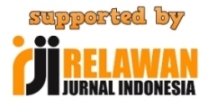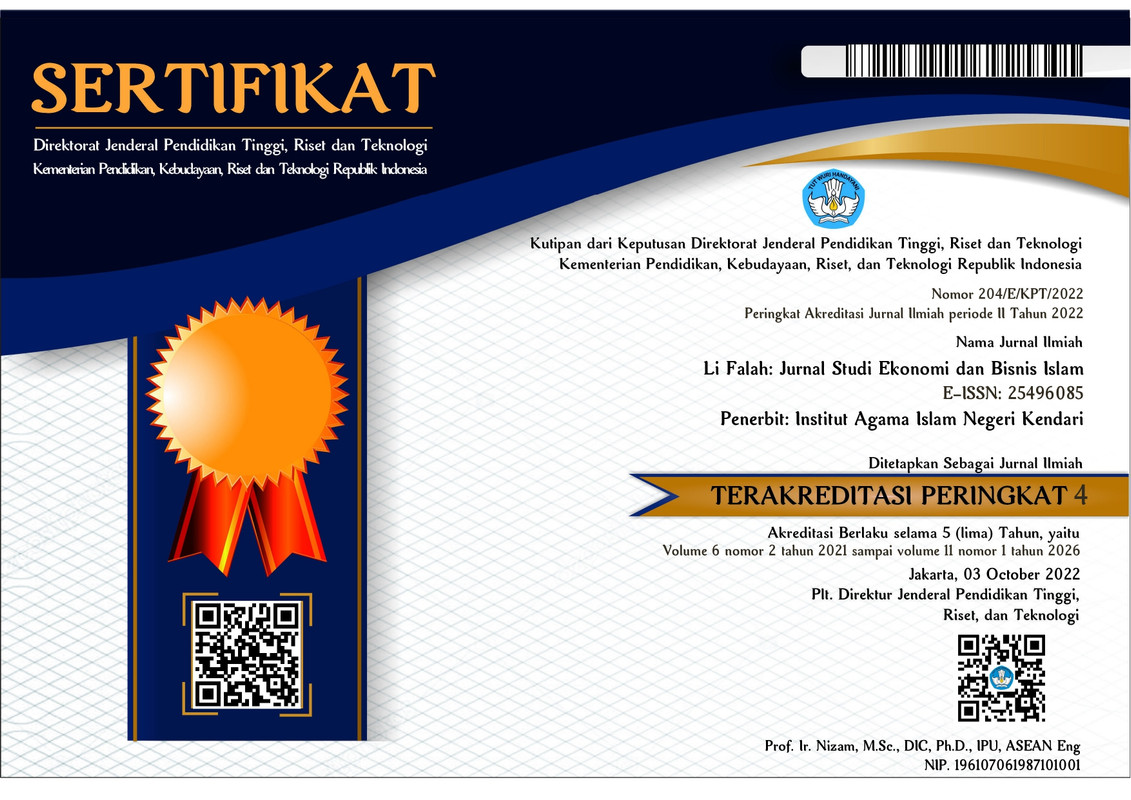Islamic Corporate Governance, Islamic Social Reporting, Financial Performance and Tax Avoidance: Women BOD and Leverage as Moderating Variables
Abstract
The impact of Islamic Corporate Governance (ICG), Islamic Social Reporting (ISR), and financial performance on tax avoidance is investigated in this study. Islamic Corporate Governance is represented by the Sharia Supervisory Board (DPS), institutional ownership, the audit committee, and independent commissioners (ICG). The effective tax rate is used to measure tax avoidance, while ROA is used to measure financial performance (ETR). Twelve Indonesian Sharia Commercial Banks that were registered with OJK between 2016 and 2021 make up the study's sample. Panel data regression is the data analysis method used. MRA analysis is additionally utilized to observe the impact of moderating variables. The study's findings indicate that tax avoidance is unaffected by DPS, institutional ownership, the audit committee, and the percentage of independent commissioners. Tax avoidance is negatively impacted by Islamic Social Reporting (ISR) and ROA. The moderating variable in this study cannot moderate the association between the audit committee and tax avoidance, specifically the women's Board of Directors (BOD). The relationship between Islamic corporate governance (ICG) and tax compliance also cannot be moderated by leverage. This research is anticipated to be taken into account by the government when drafting tax legislation to reduce tax avoidance strategies used by businesses, particularly Islamic banks. In addition, it is hoped that it will become a consideration for both financial institutions and companies to improve ISR performance and reporting as a social responsibility so that tax avoidance practices can be minimized.
Keywords
Full Text:
PDFReferences
Abdullah Alsaadi. (2020). Financial-Tax Reporting Conformity, Tax Avoidance and Corporate Social Responsibility. Journal of Financial Reporting and Accounting, 18(3).
Apriliani Preti, Pattiasina Victor, Sumarno, Entar Sutisman, & Abdul Rasyid. (2021). Investigasi Determinan Faktor Penghindararan Pajak pada PerbankanSyariah Di Indonesia. In Accounting Journal Universitas Yapis Papua (Vol. 3, Issue 1). http://jurnal1.uniyap.ac.id/uyp/index.php/accju/article/view/153
Armstrong, C. S., Blouin, J. L., & Larcker, D. F. (2015). Scholarly Commons Corporate Governance, Incentives, and Tax Avoidance. 60, 1–17.
Boussaidi Ahmed, & Hamed-Shidom Mounira. (2021). Board’s Characteristics, Ownership’s Nature and Corporate Tax Aggressiveness: New Evidence From the Tunisian Context. 16(4).
BPS Indonesia. (2022). Relasi Pendapatan Negara (Milyar Rupiah), 2020-2022. Badan Pusat Statistik. bps.go.id
Choi, J., & Park, H. (2022). Tax Avoidance, Tax Risk, and Corporate Governance: Evidence from Korea. Sustainability (Switzerland), 14(1). https://doi.org/10.3390/su14010469
Darsani, P. A., & Sukartha, I. M. (2021). The Effect of Institutional Ownership, Profitability, Leverage and Capital Intensity Ratio on Tax Avoidance. American Journal of Humanities and Social Sciences Research (AJHSSR), 5(1), 13–22. https://www.ajhssr.com/wp-content/uploads/2021/01/C215011322.pdf
Hama, A. (2020). Analisis Kecenderungan Penghindaran Pajak Penghasilan. Mitra Abisatya.
Hoseini, M., & Gerayli, M. S. (2018). The Presence of Women on the Board and Tax Avoidance : Evidence from Tehran Stock Exchange. International Journal of Finance and Managerial Accounting, 3(9), 53–62.
Jarboui, A., Saad, M. A. Ben, & Riguen, R. (2020). Tax Avoidance: do Board Gender Diversity and Sustainility Performance Mak a Difference? Journal of Finance Crime, 27(1359–0790).
Kemenkeu.go.id. (2022). Undang-Undang RI No 28 Tahun 2007. Kemenkeu.Go.Id. https://jdih.kemenkeu.go.id/fulltext/2007/28tahun2007uu.htm#Dalam%2520Undang%252DUndang%2520ini%2520yang,bagi%2520sebesar%252Dbesarnya%25kemakmuran%2520rakyat
Khan, N., Abraham, O. O., Alex, A., Eluyela, D. F., & Odianonsen, I. F. (2022a). Corporate governance, tax avoidance, and corporate social responsibility: Evidence of emerging market of Nigeria and frontier market of Pakistan. Cogent Economics and Finance, 10(1). https://doi.org/10.1080/23322039.2022.2080898
Khan, N., Abraham, O. O., Alex, A., Eluyela, D. F., & Odianonsen, I. F. (2022b). Corporate governance, tax avoidance, and corporate social responsibility: Evidence of emerging market of Nigeria and frontier market of Pakistan. Cogent Economics and Finance, 10(1). https://doi.org/10.1080/23322039.2022.2080898
Kovermann, J., & Velte, P. (2019). The Impact of Corporate Governance on Corprate Tax Avoidance-A Literatur Review. Journal of International Accounting, Auditing Adn Taxion, 36(100270).
Liyana, N. F. (2019). Menakar Masalah Dan Tantangan Administrasi Pajak: Kepatuhan Pajak Di Era Self-Assessment System. Jurnal Pajak Dan Keuangan Negara (PKN), 1(1), 6. https://doi.org/10.31092/jpkn.v1i1.606
Mappadang, A., Widyastuti, T., & Wijaya, A. M. (2018). The Effect of Corporate Governance Mechanism on Tax Avoidance: Evidence from Manufacturing Industries Listed in the Indonesian Stock Exchange. The International Journal of Social Sciences and Humanities Invention, 5(10), 5003–5007. https://doi.org/10.18535/ijsshi/v5i10.02
Melati, P. M., & Suryowati, K. (2018). Aplikasi Metode Common Effect, Fixed Effect, Dan Random Effect Untuk Menganalisis Faktor-Faktor Yang Mempengaruhi Tingkat Kemiskinan Kabupaten/Kota Di Jawa Tengah Dan Daerah Istimewa Yogyakarta. Jurnal Statistika Industri Dan Komputasi, 3(1), 41–51. http://ipm.bps.go.id/
Moeljono. (2020). Fakor-Faktor yang Mempengaruhi Penghindaran Pajak. Penelitian Ekonomi Dan Bisnis, 5028. https://doi.org/10.33633/jpeb.v5i1.2645
Muhammad Taufik. (2022). Can Shari’ah supervisory board and Islamic bank characteristics reduce tax avoidance? Evidence in Indonesia and Malaysia. Journal of Financial Crime, 29(4).
Mukhibad, H., Nurkhin, A., Waluyo Jati, K., & Yudo Jayanto, P. (2022). Corporate governance and Islamic law compliance risk. Cogent Economics and Finance, 10(1). https://doi.org/10.1080/23322039.2022.2111057
Pangaribuan, H., Fernando HB, J., Agoes, S., Sihombing, J., & Sunarsi, D. (2021). The Financial Perspective Study on Tax Avoidance. Budapest International Reseach and Critics Indtitute-Journal (BIRCI-Journal), 4(3), 4998–5009. http://bircu-journal.com/index.php/birci/article/view/2287
Peraturan Bank Indonesia. (2009). Peraturan Bank Tentangpelaksanaan Good Corporate Governancebagi Bank Umum Syariah Dan Unit Usaha Syariah.
Purbowati, R. (2021). Pengaruh Good Corporate Governance terhadap Tax Avoidance (Penghindaran Pajak). Riset Akuntansi & Keuangan, 4(1), 61–76.
Riziqiyah Metiya Fatikhatur, & Pramuka Bambang Agus. (2021). Pengaruh Islamic Corporate Governance Terhadap Tax Avoidance Pada Bank Umum Syariah Di Indonesia Bambang Agus Pramuka. Ekonomi, 21, 9–18.
Salaudeen, Y. M., & Abdulwahab, S. S. (2022). Corporate Governance Mechanism and Tax Compliance: The Nigerian Experience. European Journal of Business and Management Research, 7(2), 45–54. https://doi.org/10.24018/ejbmr.2022.7.2.1222
Saprudin, Andhitiyara Revan, & Dameria Ribkha Putri. (2022). The Influence Of Corporate Governance On Tax Avoidance (Study On Basic Industry And Chemicals Companies Listed On The Indonesia Stock Exchange). International Journal of Economics, Business and Accounting Research (IJEBAR), 10(1), 1–52. https://doi.org/10.21608/pshj.2022.250026
Sriyono, & Andesto Ronny. (2022). The Effect Of Profitability , Leverage And Sales Growth On Tax Avoidance With The Size Of The Company As A Moderation Variable. 4(1), 112–126.
Sunarsih, S., Haryono, S., & Yahya, F. (2019). Pengaruh Profitabilitas, Leverage, Corporate Governance, dan Ukuran Perusahaan Terhadap Tax Avoidance (Studi Kasus Pada Perusahaan Yang Tercatat Di Jakarta Islamic Index Tahun 2012-2016). INFERENSI: Jurnal Penelitian Sosial Keagamaan, 13(1), 127–148. https://doi.org/10.18326/infsl3.v13i1.127-148
Tao Zeng. (2019). Relationship Between Corporate Social Responsibility and Tax Avoidance: International Evidence. Social Responsibility Journal, 15(2).
Urrahman, S., & Mukti, S. H. (2021). The Effect Of Liquidity , Capital Intensity , And Inventory. International Journal of Reasearch-GRANTHAALAYAH, 9(December), 1–16. https://doi.org/10.29121/granthaalayah.v9.i12.2021
Wiratmoko, S. (2018). The effect of corporate governance, corporate social responsibility, and financial performance on tax avoidance. The Indonesian Accounting Review, 8(2), 241. https://doi.org/10.14414/tiar.v8i2.1673
Yusuf, M., Herawati, H., & Yulianti, D. H. (2021). Pengaruh Corporate Gorvenance Terhadap Tax Avoidance Dengan Profitabilitas Sebagai Pemoderasi (Studi Empiris pada perusahaan tambang yang terdaftar di Bursa Efek Indonesia. AKRUAL Jurnal Akuntansi Dan Keuangan, 3(1), 44–57.
Yusvita Nena Arinta. (2018). Pengaruh Corporate Gorvenance Islam terhadap Tax Avoidance. BISNIS, 6(2).
DOI: http://dx.doi.org/10.31332/lifalah.v8i1.6148
Copyright (c) 2023 Muhammad Agus Futuhul Ma'wa, Nur Aisyah Indarningsih, Muh. Irnandas Irnandas

This work is licensed under a Creative Commons Attribution-ShareAlike 4.0 International License.
Li Falah : Jurnal Studi Ekonomi dan Bisnis Islam, Indexed In
Accredited By
View My Stats
Organized by : Fakultas Ekonomi dan Bisnis Islam
Published by : Institut Agama Islam Negeri Kendari
Jl. Sultan Qaimuddin No. 17 Baruga Kota Kendari Provinsi Sulawesi Tenggara
phone. +62401-3193710
Fax. +62401-3193710
Email: [email protected]



















